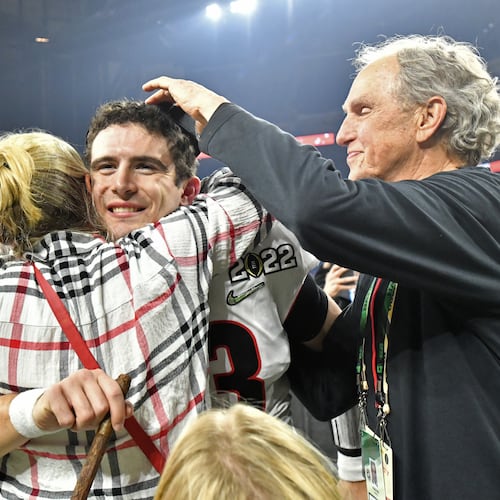So fascinating is the Georgia Bulldogs defense that it has become the greatest attraction on arguably the best college football team going (consider the gauntlet thrown, Alabama). C’mon Georgia offense, score quicker. Run your little plays, adorn the scoreboard with a few more points – but, honestly, at this pace, one touchdown is about all that’s required – and get out of the way so the headliners can take the stage.
I’d like to be more concerned about JT Daniels’ sore muscle of the week. But a defense like this tends to alleviate a lot of worry. He’s only the quarterback, after all. When he puts on another 100 pounds and expresses some interest in tackling for a loss, then we’ll really fret about each injury.
So dominant has the nation’s best D been in allowing just 4.6 points per game through its first five – blanking its past two SEC opponents, first time a Georgia team has done that since the sacred year of 1980 – that a person almost feels bad for the poor sods on the other side of the line.
Well, not for Saturday’s opponent, Auburn. And certainly not for Florida. Nor Tennessee. Oh, just forget it. Let the beatings continue in all good conscience.
Georgia is positioning itself to be regarded as special on defense. In the face of ever more versatile and explosive offensive schemes in the SEC – even Nick Saban was forced to open up and take some risks in the name of big plays – the Bulldogs once more are lifting up the chalice of defense. A defense that travels well, that can carry a team even in an age when every rule is skewed in the offense’s favor. A defense that won’t be cowed by the moment or the setting. Auburn figures to be the Bulldogs’ first real unfriendly road game of the season. And there’s a sense that this unit might well feed off hostility like it was honey.
Kirby Smart, sly Dawg that he is, likes to say this is a Bulldogs team without a superstar. “I don’t think you can name one superstar really on this whole team,” he recently contended. “Personalities outside our world, our family, want there to be a superstar, want there to be one person. But there’s not, not on this team. Because it’s done by committee, across the board.”
Yet, linebacker Nakobe Dean might argue that point as he’s racing through token opposition on his way to the ball.
And, because of their unnatural combination of size and dexterity, certain of Georgia’s defensive linemen are gaining cult-figure status at the very least. Here, cue the replay of Jalen Carter and Jordan Davis – a combined 660 pounds of defensive tackles – joining the offense on a goal-line run against Arkansas, making everyone else look small on a touchdown play. Carter took out more Hogs than Smithfield on that play (three, actually).
And, still, the greatest sight of them all on this Georgia team is that of the massive Davis running sideline to sideline in nimble pursuit of a ball carrier. It’s unfair, someone that large possessing Nureyev’s feet. “We all athletes,” Davis likes to remind the audience. “Everyone on the team is an athlete. We all swarm, we all push each other.”
In keeping his defense wanting more, Smart has begun using the word “elite” more than the Navy SEALs. He holds that status out there as a goal that this defense can see, can reach for, but can’t yet touch.
Georgia leads college football in almost every significant defensive measure. And by a wide margin over second best – its 177 yards per game allowed is nearly 60 yards better than No. 2 Iowa State; its single offensive touchdown allowed is four better than No. 2 Clemson.
Yet, this a defense with designs on measuring itself against the ages.
Using that as motivation, so goes the theory, it can’t get fat and satisfied. “The standard of being elite is what keeps them from becoming poisoned (by all the positive press),” Smart said. “And when you compare yourself against greatness, there’s a certain standard you have to reach, and it kind of supersedes the opponent.
“You say you want to be great, what does that look like?” Smart continued. “You see pictures of that, see stats that reflect that, that’s what you’re trying to emulate.”
Greatness, from another era, would be Bear Bryant’s first national championship team at Alabama (1961), unbeaten and practically unscored upon – allowing only 22 points in 10 games. Or the 1939 Tennessee Volunteers, who held every regular-season opponent scoreless.
More recent vintage would be two defenses that clashed twice in 2011: That belonging to LSU – which averaged 2-plus takeaways a game. And Alabama’s, which gave up 8.2 points per game and contained 14 future NFL players on its depth chart.
Were the 2001 national champion Miami Hurricanes the greatest team of the century? A defense that sowed havoc and harvested four turnovers a game helps the argument.
That is the kind of company Georgia wishes to keep, and that is what makes this defense such a wonder to watch.
About the Author
The Latest
Featured



